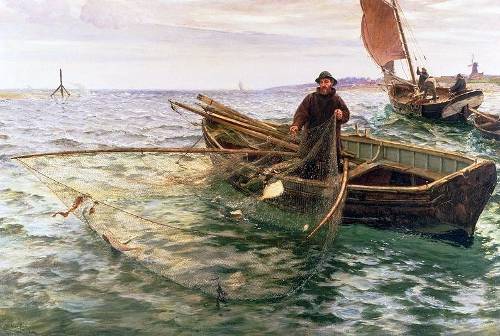
piscation
n. fishing
halieutics
n. a treatise on fish or the art of fishing

piscation
n. fishing
halieutics
n. a treatise on fish or the art of fishing
Two very old stories are worth repeating for their peculiar excellence. A Scotch newspaper, reporting the danger that an express-train had run in consequence of a cow going upon the line, said, ‘As the safest way, the engineer put on full steam, dashed up against the cow, and literally cut her into calves.’ In the earlier half of this century a London paper announced that Sir Robert Peel and a party of fiends were shooting peasants in Ireland.
— William Shepard Walsh, Handy-Book of Literary Curiosities, 1892
If A = 1, B = 2, etc., then:
Discovered by Edward Wolpow and Dmitri Borgmann. See Truthful Numbers.

On Aug. 21, 1974, the London Times announced the reassignment of a Church of England cleric:
Diocese of Salisbury. The Rev J.E.B. Cattell, Vicar of Piddletrenthide with Alton Pancras and Plush, to be priest-in-charge of Buckhorn Weston and Kington Magna.
This drew a flood of responses. Excerpts:
Is there really a parish of Piddletrenthide with Lanton Pancras and Plush? If so, I will have to retire there; it certainly is an improvement on ‘Maidstone.’
It’s in West Dorset and is as delightful as its name implies. We also have Toller Pocorum, Sydling St Nicholas, Whitchurch Canonicorum, and Ryme Intrinseca, to name but four others.
For sheer pleasure to the ear the redeployment of ecclesiastical strength in Yorkshire which appeared in your columns some 14 years ago remains supreme: ‘the Rev G.D. Beaglehole, Vicar of Kexby with Wilberfoss to be Vicar of Bossall with Buttercrambe.’
In 1960 you also announced: ‘The Rev G. Christie, Rector of Roos with Tunstall-in-Holderness, Vicar of Garton with Grimston and Hilston and Rural Dean of South Holderness to be Vicar of Pocklington with Yapham-cum-Meltonby and Owsthorpe with Kilnwick Percy, and Millington with Great Givendale, and Rural Dean of Pocklington.’
We in Hampshire can surely beat them all with our three hearty Wallops — Over, Middle and Nether.
One signpost in Shropshire reads simply: Homer 1, Wigwig 2. How’s that for brevity and wit?
May I on behalf of Scotland offer a brief contribution to this correspondence and draw attention to the tiny but ancient fishing village on the south shore of the Firth of Forth, which proudly bears the name ‘Society’?
The first place listed in Part Two of the 1961 Census Index of Place Names aptly describes the efforts of your readers in this silly correspondence: Labour-in-Vain.
A final letter read, “Sir, as a foreigner, may I say how enjoyable has been your correspondence on this subject, for in my country we do not have such quaint place-names.” It was signed “K.J. Wyatt, Turramurra, Kur-ring-gai, New South Wales.”
ultracrepidarian
adj. one who gives opinions and advice on topics beyond his knowledge
Contrived names of American hair-cutting establishments, from a 1979 survey by Ross Eckler:
“Cutting Corners (Boston, Providence) sounds like a place to avoid.”
expergefaction
n. waking up
matutolypea
n. ill humor in the morning; “getting up on the wrong side of the bed”
“An Extraordinary Sleeper at Newcastle”
In the year 1752, during the summer, the following particulars happened at Newcastle, in Staffordshire, related by a lady of discernment and veracity, who went to see the sleeper several times. She was a girl about 19 years of age; she slept 14 weeks, without waking, although several methods were tried to wake her, as bleeding, blistering, &c.; in all which time she took no sustenance, except about nine o’clock every night, she opened her mouth, and then some person that attended her, dipped a feather in wine, and with that wetted the inside of her mouth. Her father often gave her an airing in a horse chair, and sometimes took her several miles, to have the advice of the physicians; but neither the motion of travelling, nor any thing the physicians could do, could awake her; she appeared to be healthy all the time, breathed freely, and her pulse beat very regularly, but rather too slow; she never moved herself all the time, except once, it is thought, she moved one leg. When she awaked, it was very gradually, being two or three days from the time she began to stir and open her eyes, before she was quite awake, and then seemed to be very well, but complained of faintness. I heard, last summer, that she had good health, and had no return of her sleepiness.
— Gentleman’s Magazine, 1753, quoted in Kirby’s Wonderful and Eccentric Museum, 1820
In 1979, Time magazine reported that Zachary Zzzra had been nudged out of last place in San Francisco’s telephone directory by Zelda Zzzwramp. He added another Z to his name but was then overtaken by Vladimir Zzzzzzabakov.
So he changed his name to Zzzzzzzzzra.
Zzzzzzzzzra was really Bill Holland, a 59-year-old painting contractor who told potential customers to look him up in the back of the book. The gimmick worked, he said, but his phone bill often exceeded $400. “People making illegal calls from phone booths look up the last name in the book and charge them to me,” he said. “I don’t pay a damn one of them.”
Harry B. Partridge points out that most presidents whose names have contained a penultimate L — Ronald Reagan, Abraham Lincoln, James Garfield, Franklin Roosevelt, John Fitzgerald Kennedy — have died in office or survived an assassination attempt. He speculates that Gerald Ford survived because he was born Leslie Lynch King Jr., and that Theodore Roosevelt was divinely spared because THEO means God. (James Polk died three months after leaving office.)
Partridge also notes that a name with patronymic prefix (Mc, Fitz, etc.) is invariably fatal. To date there have been only two: William McKinley and John Fitzgerald Kennedy.
See Tecumseh’s Curse.